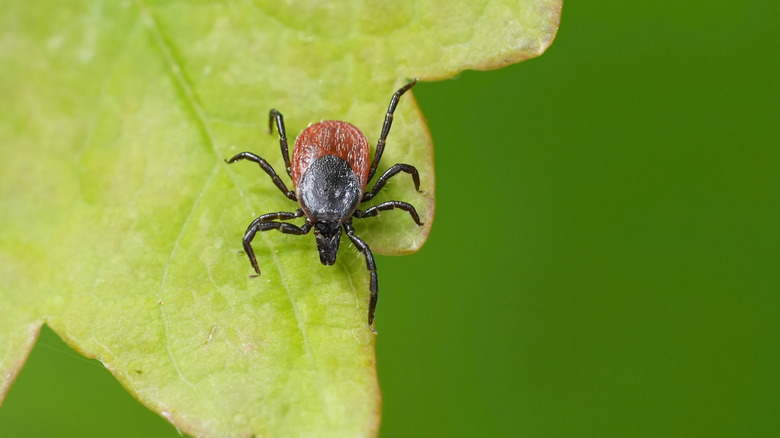The Hardy Perennial That Can Keep Ticks Out Of The Garden
Ticks don't need much to turn your yard into a health hazard. They cling to tall grass, hide in shady corners, and wait for anything warm-blooded to pass by. A single bite can spread serious diseases like Lyme or Rocky Mountain spotted fever, and for families with kids or pets, the risk is hard to ignore. But one surprising way to keep ticks out? Well, the solution might already be growing in your herb garden.
Rosemary is a natural pest repellent packed with strong, aromatic oils. Best of all, it's a perennial that will come back year after year. Compounds in rosemary like cineole and camphor confuse a tick's sense of direction by blocking the scent trails they rely on to find hosts. Without those signals, they tend to stay away. The scent is also known to drive off mosquitoes and flies, giving rosemary a double purpose in the garden. In a Pest Management Science study from 2021, a compound found in tiny amounts in rosemary oil called terpinolene worked in repelling American dog ticks.
While the study was limited to controlled settings, it shows just how effective this plant's chemistry might be. Rosemary is often recommended as one of the garden plants that keeps ticks at bay, but it's not a cure-all. It won't eliminate or repel ticks entirely, especially if your yard backs up to wild or wooded areas. If ticks are already well established in your yard or are showing up indoors, it's best to call a licensed pest control professional.
Growing rosemary to deter ticks in your garden
Rosemary is easy to grow, especially if you live in a warm, sunny part of the U.S. This tough, drought-tolerant shrub thrives in USDA Hardiness Zones 8 through 10, where it can grow outdoors year-round. If you're in a cooler climate, you can still take advantage of its tick-repelling power by growing it in containers and bringing it indoors before the first cold snap. To get the most out of your rosemary, plant it in full sun and well-draining soil.
This herb can deter ticks, but it needs the right conditions. Once it's established, avoid over-watering. Too much moisture can stress the plant and weaken the oils in its leaves that help keep ticks away. Frequent pruning keeps rosemary looking full and helps release more of its fragrant oils into the air. Where you plant it matters, too. Try lining walkways, patios, pet areas, or lawn edges to create a natural barrier between tick-prone spots, like brush or tall grass, and wherever your family hangs out. Even a few potted rosemary plants outside can add extra protection right where you need it.
Put rosemary essential oil into a quick spray for added protection. Combine ¼ cup of apple cider vinegar, ¼ cup of water, and 40 drops of rosemary essential oil in a spray bottle. Shake well and spritz around entryways, garden beds, or outdoor seating areas. The rosemary insecticide won't replace full-scale prevention, but it's a helpful boost, and smells great, too. For best results, pair rosemary with smart yard habits like mowing regularly, clearing out leaf litter, and laying down tick-repelling mulch to complete your defense.

